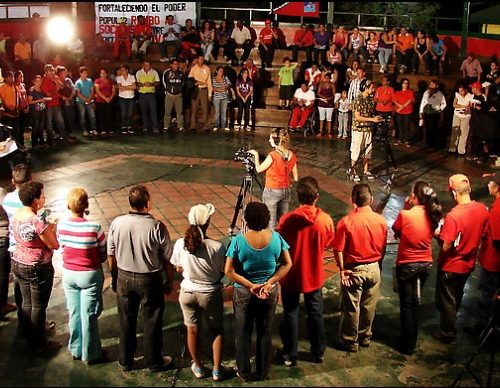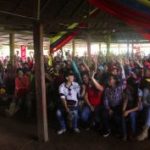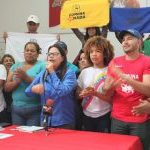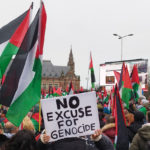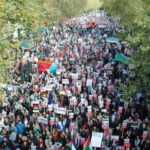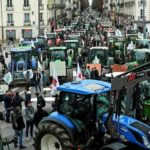Interview with Blanca Eekhout, Minister of Municipalities of the Bolivarian Republic of Venezuela:
(The Posadists Today reproduce this important interview published in Venezuela Info, 15 June 2019).
From abroad, Venezuela is often portrayed as a dictatorship, where the head of state, Nicolas Maduro, would rule in an authoritarian and violent way without taking into account popular aspirations. This description, however, comes up against a reality that cannot be denied: Chavismo and President Maduro have the support of a significant part of the Venezuelan population. Propaganda of the media system does not answer the question: Why?
One of the elements of answer is to look for the side of the direct and participative democracy implanted in Venezuela since the advent of Hugo Chávez in power. This central aspect of the Bolivarian Revolution is systematically denied by the media system. The Venezuelan people’s struggles within the system of Communal Councils and Socialist Communes are invisible. So we went to interview Blanca Eekhout, Minister of the Commons, to explain to the French-speaking reader the originality and robustness of Venezuelan democracy.
Blanca is a social activist from the beginning, she was the founder of many media associations such as Catia Tv, and became the first president of the public channel ViVe TV, then VTV. Elected in 2010, she will become vice-president of the National Assembly from 2011 to 2015. This young woman, who devoted her life to the social struggle and the deepening of democracy in her country, has held several positions of the senior civil service. She was Minister of Communication and Information (2009-2010), Minister of Women and Gender Equality (2016-2018). She is now Minister of the Commons since September 2018.
The Ministry of Communes is located in the center of Caracas in a building where several street vendors were relocated a few years ago. It seemed logical that this central ministry deserted the traditional administrative districts to establish itself alongside the people. The minister will receive us in her modest office where a portrait of Hugo Chávez and Josefa Camejo, a heroine of Venezuela’s war of independence, stands side by side: a good iconographic summary of the political path of our interlocutor.
While Blanca responded passionately and passionately to my questions, I was thinking of the claims of the French Yellow Vests, expressed several thousand kilometers from Caracas. In question ? The themes evoked by the Venezuelan minister: the Constituent Assembly and the popular mobilization to write the new Supreme Charter, the modalities of the recalling referendum for all the elected representatives, the strength of the communal councils and the communes – where all the decisions are made during ‘General Assemblies-‘, the need to invent new forms of ownership to develop the country. The words of Blanca Eekhout fuse like a burst of AK47, each ball is a concept that echoes the political concerns expressed on the roundabouts of France.
The other story that you can read below testifies to the extraordinary democratic liveliness of Venezuela, which marks the backbone of the political project of the Bolivarian Revolution. We understand better then the terrible political and media violence that falls against this people. Venezuelan participatory democracy must be absolutely swept away to prevent the risk of 1, 2, 3 Blanca blooming. For this model does not give ideas to others and does not threaten the political system still dominant … for now.
With Blanca Eeckout, Caracas 2019.
Romain Migus : What are the roots of participatory democracy in Venezuela? How was the democratic model of the Bolivarian Revolution constructed?
Blanca Eekhout : We have to start with the beginning of our political movement, or at least the takeover by Commander Chávez. His first government action was to convene a constituent national process. Hugo Chávez called on the people to rebuild our republic. Before that, all our legal framework was determined by the power in place, by the oligarchies but also by the historical dependence inherited from our colonial history. So, rebuilding our Republic involved changing the supreme charter, but the most important thing was who would participate in this debate. The first action was therefore to convene a referendum to set up this constituent process. This extraordinary political fact was rooted in Angostura Congress, conducted under the auspices of our Liberator Simon Bolivar, in 1819 (1). Bolivar will give a historic speech at this congress and will recall in particular: “Happy the citizen who invokes and summons his people, consults the will of the sovereign.” It is for this reason that in Venezuela, from 1999, once the new constitution is approved, our democracy has become participatory and “protagonic”.
RM: Excuse me for interrupting you, but could you explain to our readers how the constituent committees were organized? How did the debate take place among the population to feed projects this National Constituent Assembly?
BE: First, there was a national election to choose our representatives: there were natives, workers, women as a movement, fishermen, peasants, all the social forces, those who were invisible, those who had never been consulted about the fate of their country or the laws that governed their lives. But the real consultation was done at street meetings. Different mechanisms were created by which proposals were systematized; trucks collected proposals throughout the national territory. The initial movements, those of the workers ‘and peasants’ movement, participated in letters of proposals and historical requests. It was a national consultation very, very broad and complete because we the model from which we wanted to leave had had as objective the application of the neoliberal measures dictated by the IMF and the World Bank. This provoked a strong response from the people who took to the streets in 1989. This event, which we call Caracazo, was violently repressed. All the demands that were expressed in reaction to the neoliberal model ended up being gathered in the process constituting, as a request of the Republic, to guarantee the right to the Social Security, the reaffirmation of our right to the free education, free health, redistribution of income, recognition of indigenous rights, etc.
At first we had a national revolt but we did not yet have a sufficiently organized social movement development. It is the convocation of the President to a Constituent National Assembly that causes many of these movements to come together as a national force. For example, communication is recognized as a human right; for the first time, alternative media are beginning to occupy the wireless space while in the old model, they were considered illegal, pirates, and were punished. We have started a process of revision of the oil question, as well as the agrarian question for all these terrible practices of land ransacking by the big landowners; that is why the peasant movement advances from the constituent process. This process has been an impetus for the development, consolidation and reinforcement of the different social movements in our country.
“We are a constituent and sovereign people”
RM: It can be said that the constituent process marks the beginning of a new democracy. How is it different from the representative democracy in which the majority of the peoples of the world live?
BE: In the first place, we have innovated with regard to the permanent exercise of power and the non-delegation of the will. That is to say that for the Venezuelan people, our sovereignty resides in the people, it can not be delegated. That is why we go beyond the model of representative democracy in which every five or six years, depending on the elections, the people end up delegating their right of sovereignty to another. In the case of Venezuela, it can not be delegated even if we reaffirm the direct and universal election. In Venezuela, we broke records because we had 25 electoral processes. At our Constituent Assembly, we included the possibility for citizens to organize a mid-term recall recall referendum for all elected representatives. We were the first country to hold a recall referendum for the President of the Republic. We held a recall referendum to President Chavez; and he has been confirmed in his duties. But in Venezuela, I said that the exercise of democracy and participation is not delimited by elections after a five-year term or sextennat. First, we are expanding powers. Of the three traditional powers in democracy (executive, legislative and judicial), we have added two: electoral power and moral power. Electoral power has become a power with sufficient strength and autonomy to guarantee free, direct, transparent, fully automated elections (2). As for the moral power, it deals with everything that has to do with the defense of the people (3), taxation; he became an important power inside the Republic.
On top of that, we have established something more important and again, it is the empowerment of the people. Popular power is the permanent exercise of self-government on the territory. We have approved laws to organize this popular power, and which determine the organization, the economic development of all that is this model of transfer of political attributions, management of economic resources. That’s what gives us strength today in the country.
RM: Before tackling the experience of the communes, we are already going to talk about communal councils. The first communal council law was passed in 2006 and, I believe, there have been many changes to adapt it little by little to the concrete reality. This also shows that Venezuela is inventing a new system and that at least in the beginning, he fumbled. We will ask a basic question, but essential for our readers who know almost nothing of the model of Venezuelan democracy: what is a communal council? What does it consist on ?
BE: The law of the Communal Councils guarantees the exercise, at all territorial levels of our neighborhood communities, of all the citizens of a territory, to meet as a Citizens’ Assembly. They decide on the action processes during a general speech. Through direct elections, during territorial assemblies, it is decided by the General Assembly who is at the head of projects, committees, and the implementation of public policies in the territory. We also have a law to organize the popular economy, we have the laws that govern the organization of the communes, as well as laws of communication which also come under the power of the people.
RM: Who decides on the radius of action of the Communal Council? By whom will it be composed? What is the relationship with the state and the administrative levels of representative democracy that continue to exist?
BE: Within the Municipal Council, people decide, in the Assembly of the territorial space which will delimit the action of their council. Citizens must be willing to regroup voluntarily according to the geographical delimitation of their territory. There are much smaller communal councils, there are larger ones; if they are formed in urbanized areas, the population is concentrated in a building, and this may depend on urban planning. In buildings in the same neighborhood, there may be two or even three councils. The citizens’ assembly also decides on organizational capacity. For us, the citizen assembly is the most important forum for deliberation; this is what is written in Article 20 of our Communal Councils Act (4). It is also the decision-making body for the exercise of power of the neighborhood communities: participation and popular protagonism. The decisions of the municipal council must apply in a mandatory manner. The municipal council is recognized by all the other authorities, whether municipal or regional. Communal councils in a peasant community may be made up of a smaller number of families because of the vastness of the space and the low concentration of population. Thus, the citizens’ assemblies establish themselves the delimitation of their territorial space.
RM: How do people organize themselves in the communal council?
BE: In the Communal Council, there are health committees, education, culture, food, popular communication, there is also a committee of equity and gender equality, and well other committees depending on the reality of life on the territory of the Municipal Council. But there is also a committee that deals with the issue of the economy and another one that deals with security. For security we mean not only the inter-personal security, but also the security and the integral defense of our territory which is constantly threatened by a foreign invasion.
RM: How many communal councils are there all over the Venezuelan territory?
BE: Right now, there are 47,834. That’s the equivalent of 14 million people.
RM: This deepening of direct democracy and popular power has led you to reconsider the theme of ownership (land and means of production). How do these two themes fit together? Why, alongside private or public property, did you have to include direct and indirect social ownership? How are the people’s economy and people’s power interconnected?
BE: The family production units, many of them are also discussed in citizen assembly. The development of a family production unit, a Social Production Company, many such achievements are born in the debate during the assembly of citizens. At this moment, we are still working to amplify the types of property, not only the types of social property organization but also the types of individual and family property that exist in the municipality and put themselves at the service of the municipality. . We still have a lot to do with regard to the development of a communal economic model, a communal economic circuit.
The initiatives and experiences of some communes are extraordinary, but we have not yet reached a total articulation. We have money or communal banking systems that exist, but the development is uneven. There are municipalities that have been able to exceed the expectations of productive capacity and others that have failed to grow economically and continue to be isolated experiences. Today, we are doing important work to systematize social and collective property. We are also inspired by peasant councils that do not all function according to social ownership. The peasants have the property of their land, individual or family property, and nevertheless, from experience co-operatives they end up gathering so that all the production of a municipality is added to a collective effort although the property is diversified . The mechanisms and the types of property are diversified on the municipal territory and we face a huge challenge which is to guarantee that everything allows the self-management, the food autonomy and the economic reinforcement on the territory.
RM: Let’s come to the Commune. What do you call a Commune in Venezuela? How would you explain to a person who does not know everything about this first-rate political process, what is a municipality and how does it work? What is the relationship of the municipality with the communal councils?
BE: Maybe the first thing would be to say that this is a group of communal councils but it is much more than that. The idea is that all the forces and movements present on a territory form a commune. In addition to the Communal Councils, the Commune has youth councils, peasant councils, production councils for workers; all that makes the political and economic life of a territory comes to form the commune. The various committees that form a communal council then have a spokesperson, who in the municipality participates in self-government bodies. A spokesman for each communal council sits in the parliament of the municipality. The idea is that this constitutes a system of aggregation and determines a new geometry of power. The objective is that at a given moment, this communal model goes beyond the structures inherited from our old state, where the administrative model is based on the city hall, or the regional government. These structures that come from colonization are very much related to the old model of representative democracy. They are not part of the permanent and direct system of self-government of the people in a territory that it has itself decided. Today in Venezuela, there are 3078 municipalities of this type. In the commune and the communal council, the assembly of citizens is the superior instance, reason for which it allows a permanent democracy which can not be delegated. It is a full democracy, it is participative, protagonic.
RM: What is the relationship between this communal state that takes shape and the traditional structures of the Venezuelan state?
BE: The old state structures, town halls, municipal councils, regional governments, continue to have a role. We have maintained them, we have renovated them, we continue to organize elections – that Chavismo has just won, by the way – but we believe that if the power resides in the people, the exercise of democracy by this sovereign who is the people, must be permanent and the development of public policies must also be in the hands of the people. That is why, for us, the power of the commune and communal council is the basis of what the new state, a truly popular state, a state that breaks with the bureaucracy, with the heritage of this model of false bourgeois and representative democracy. We are in a process of permanent invention with mistakes and successes but we are trying to build another model. We can be protagonists of our political process only by doing it, meeting with ourselves, debating, and discussing it at the same time as we are a protagonist of this change.
General Assembly to elect the self-government of Simon Bolivar Commune in the rural state of Apure (photo: Carolina Cruz)
RM: If the communal council depends in part on local or national administrative bodies to finance its projects, the municipality intends to be truly autonomous. What about the communal economy?
BE: The municipality has its own way of functioning but it integrates the initiatives of the central state such as the creation of a committee for social protection or the Carnet de la Patrie (5). She also takes on new tasks. Because of the war we are undergoing, the Local Supply and Production Committees (CLAP) have been created and are in charge of the direct distribution of food in the Commune, house by house (5).
The Commune must be self-sufficient in time, and have the capacity to produce in all sectors: agricultural, tourist and even in the communal industry because we have developed thanks to the state investment processes communal industries which guarantee both the supply at the level of the municipality and the exchange and the contribution at the national level. The economic development of the municipality is a fundamental element for a municipality to be a municipality. In these times of war, production is an urgent necessity. But there are also differentiated processes: the production capacity is not the same in an urbanized area as in a rural community.
RM: Of course.
BE: Nevertheless, in the urban communes, we have communal bakeries, communal vegetable gardens, people are starting to develop textile activity and we have obtained, that within an urban commune, there are brigades the state has allocated land to produce in rural areas and produce products in urban areas.
RM: What is the link between the State, the Ministry of Communes, of which you are the highest representative, and the municipalities themselves? That is to say, between this inherited state but also necessary to apply a macro-policy, and organized popular forces?
BE: The Ministry of Communes promotes the organization of the Commune, it facilitates the mechanisms so that it is legal, so that it is organized, so that we form the citizens and they can be constituted in communal councils then in common. Thus, one of the main tasks is to promote the organization of the people so that they can establish their own mechanisms of self-government. Another important element is training. On the one hand, in the process of production and on the other hand in the implementation of policies on the territory, public policies that are made at the level of the municipality. In fact, we support all nascent leadership for the formation of Commons. But there is another element that represents an important task for us as a ministry. We must allow the national articulation of all the communes. Commander Chávez said that an isolated commune could even be counter-revolutionary. The only way to make it revolutionary, profoundly democratic and transformative is that there is a communal social fabric, that there is a real articulation between all the communes. We promote the organization of congresses and meetings between municipalities. At a recent national meeting that we organized, came the idea of the creation of a University of the Commons. Or should I say a Multiversity rather than University. All this work of putting in relation depends on the Ministry. It provides, when necessary, resources for the development of production initiatives, seeds for agriculture, tools, machinery.
But the organization of the communes can not fall exclusively under the responsibility of the Ministry of Communes. There is such a level of development of the communal forces that they themselves are and must be promoters of the creation of other communes, and organizers of this great national communal movement. We are therefore in a phase of transfer of power and attributions held by the Ministry to the municipalities. For the organization of the territory, one of the mechanisms is: “the commune sows other communes”. A pioneering, enterprising municipality that has developed significantly economically, socially and politically is becoming a multiplying factor of the municipalities from its operation.
The Minister of Municipalities Blanca Eeckhout during an exchange with the comuneros.
RM: What are your next political challenges?
BE: We believe that the permanent exercise of democracy is more than ever necessary. This is why we must accelerate the transfer of new attributions to the communal movement. We are currently in a phase of organizing elections to guarantee the renewal of leadership, and the strengthening of citizen assemblies. And we are organizing this in a complex scenario, because of all the threats and attacks against our country, as well as the economic war against Venezuela.
RM: Last question, what is the importance of the theme of democracy for the Bolivarian Revolution in Venezuela?
BE: The Bolivarian Revolution in Venezuela exists because there is an organized people who exercise power. Without that, we would not have been able to stand the terrible attacks we have suffered for twenty years. We have been applied all the doctrines of war to transform Venezuela into a rogue state, almost bankrupt, we live under the constant threat of coups d’Etat and military intervention. In these circumstances, in the most difficult moments, the Revolution has always summoned the sovereign people, as was the case during the constituent process that we initiated in 2017.
That year, when we had faced for weeks an insurrectional episode that could cause a civil war in the country, President Nicolas Maduro decided to consult the people, and to convene a Constituent Assembly again. This process was even more democratic than the one we did in 1999 because the election process was territorial and by sectors of the population. We have directly chosen our own spokespersons for the elderly, for the disabled, for the peasants, for the fishermen, for the youth, for the workers, for the communes, for all the vital forces of our community. country. There are representatives from all sectors in our Constituent National Assembly.
At present, there is a debate about everything, open and fierce, but what was fundamental to go to this National Constituent Assembly was to seek peace. This shows that democracy brings peace, true democracy, that which does not reduce the will of the people, which is not representative democracy. Participatory and protagonic democracy is a guarantee of peace and is the guarantee of a homeland. In the most difficult moments, our President Nicolas Maduro, as well as Commander Chavez before him, constantly called for dialogue, negotiation, listening to others, and he has assumed enormous commitments in this dialogue, such as renovate all the powers in the middle of a war.
In 2017 and 2018, in the middle of the economic war (6), the terrorist war, the attempted civil war (7), we convened a constituent process and we won. The voice of the people is the voice of God, it has manifested itself and we have found peace the day after the election of the constituent deputies. Then we called municipal and regional elections and finally a presidential election, and we won. I believe that, with difficulty, in a state of siege, in a situation of blockade, a government submits to as many elections as we have done. It is the trust of the people, it is the direct and real exercise of the will of the people to live in a democracy and to have peace. Faced with all the threats of fascist barbarism, I do not believe that there are other ways to guarantee our revolution, if not by total democracy. Because, thus, it is the whole people who are concerned and who unite to defend it.
This is a people in motion. And to be in motion, he must be protagonist of his destiny. He can not be a “stone guest”. This is why, despite the media lies, despite the fact that millions of men and women have been made completely invisible, they continue to defend this revolution. If we resist and continue to move forward, it is because the people are a real political actor, because this democracy is a true democracy.
Excerpt from our meeting with Blanca Eekhout (in French):
This interview would surely still be a .mp3 file hidden in one of the many files of my computer without the precious and admirable help of Sylvie Carrasco who helped us to transcribe it and to translate it. May it be thanked a thousand times.
Notes added by us:
(1) Concluded by Simon Bolivar on February 15, 1819 in the city of Angostura (now Ciudad Bolivar) in Venezuela, this Constituent Assembly aimed to organize administratively and legislatively the liberated territories of the Spanish Empire or in the process of ‘be.
(2) To know how the electoral power, and the Venezuelan electoral system, read Romain Migus, “To understand everything about the new offensive against Venezuela”, Venezuela in Vivo , 09/01/2018, https: //www.romainmigus .info / 2019/01 / all-understanding-of-the-nouvelle.html
(3) The People’s Advocate is an equivalent figure to the Defender of Rights in France.
(4) “Ley Organica de los Consejos Comunales”, published in the official journal nº39.335, 28/12/2009, available at http://www.minci.gob.ve/wp-content/uploads/downloads/2012/ 11 / LEY-Consejos-communal-6-11-2012-WEB.pdf
(5) To understand the system of the Carnet de la Patrie or CLAP, read Romain Migus, “Between Emergency Measures and State Construction. Chronicles from below # 4, Venezuela en Vivo , 02/08/2018,
https://www.romainmigus.info/2018/08/entre-mesures-durgence-et-construction.html
(6) To realize the ferocity of the economic war against Venezuela, read Romain Migus, “Updated chronology of economic sanctions against Venezuela”, Venezuela in Vivo, https://www.romainmigus.info/2019/01 /chronologie-des-sanctions-economiques.html
(7) Read Maurice Lemoine, Chronicle of a destabilization , Montreuil: ed. The Time of Cherries, 2019.
The original source of this article is Venezuela en Vivo
Copyright © Blanca Eekhout and Romain Migus , Venezuela in Vivo , 2019
The URL of this article is:
https://translate.google.co.uk/translate?hl=en&sl=fr&u=https://www.mondialisation.ca/la-democratie-participative-au-venezuela/5634810&prev=search
